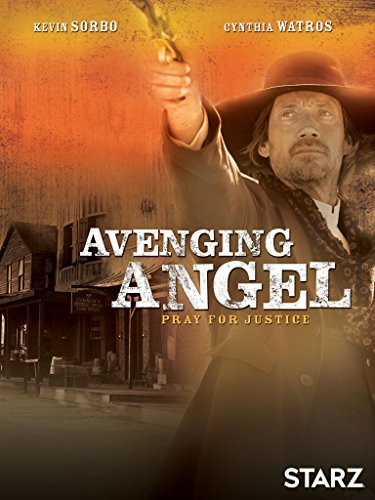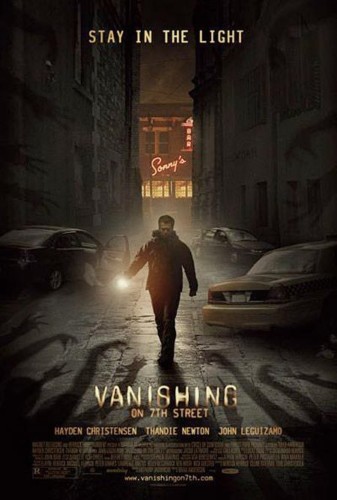 Avenging Angel (2007) – Unambitious western fare: Kevin Sorbo is a preacher who, on his first Sunday in town, protects some “squatters” who are being ill-treated by land baron Wings Hauser, and has his church exploded and his wife and child killed for his trouble. A year later, after working as a bounty hunter trying to clean up the west, he’s back in town to find that the leader of the land baron’s mob is now the sheriff, and that another group of settler “squatters” is about to be cheated and run off like the last group.
Avenging Angel (2007) – Unambitious western fare: Kevin Sorbo is a preacher who, on his first Sunday in town, protects some “squatters” who are being ill-treated by land baron Wings Hauser, and has his church exploded and his wife and child killed for his trouble. A year later, after working as a bounty hunter trying to clean up the west, he’s back in town to find that the leader of the land baron’s mob is now the sheriff, and that another group of settler “squatters” is about to be cheated and run off like the last group.
There’s plenty of potential for drama here, but most of it is muted or squandered in favor of keeping it “family friendly.” Sorbo never really has a crisis of faith or how to pursue it; no one explains why Hauser has to have “those people” off “his” land right now; no one explains why a frontier town whose only church exploded a year ago hasn’t started constructing another or getting a new preacher. And the single mother with whom Sorbo constructs a surrogate family has an improbably large rented house for only sweeping bars and doing people’s laundry.
 Son of Kong (1933) – Knowing they wanted to build on the success of King Kong earlier that year and realizing that they couldn’t really match the spectacle of the first one, the powers-that-be recruited two supporting characters to come back (Carl Denham, who’s now on the hook for a dozen lawsuits in NYC, and Captain Englehorn of the ship that made the original Kong Island voyage), have a reason to go back to Kong Island, and discover… the much less impressive progeny of Kong, a 20-foot-tall ape with white skin and a much less aggressive demeanor. In fact, he’s played for laughs more often than not. Which just shows how to NOT follow up a groundbreaking and imagination-seizing spectacle.
Son of Kong (1933) – Knowing they wanted to build on the success of King Kong earlier that year and realizing that they couldn’t really match the spectacle of the first one, the powers-that-be recruited two supporting characters to come back (Carl Denham, who’s now on the hook for a dozen lawsuits in NYC, and Captain Englehorn of the ship that made the original Kong Island voyage), have a reason to go back to Kong Island, and discover… the much less impressive progeny of Kong, a 20-foot-tall ape with white skin and a much less aggressive demeanor. In fact, he’s played for laughs more often than not. Which just shows how to NOT follow up a groundbreaking and imagination-seizing spectacle.
Bad Reaction #1: When you realize that the middle-aged male lead is getting together with the 20-year-old female lead.
Bad Reaction #2: “Wait — I’m a full seven years older than the middle-aged male lead was.”
 Vanishing on 7th Street (2010) – I’m a sucker for “reality has changed” premises, which is why I was working on a novel concept (it began as a comic book idea) which shared several oddly specific ideas with Vanishing on 7th Street right when the movie came out. So I hated it, sight unseen, and never bothered to see it until now.
Vanishing on 7th Street (2010) – I’m a sucker for “reality has changed” premises, which is why I was working on a novel concept (it began as a comic book idea) which shared several oddly specific ideas with Vanishing on 7th Street right when the movie came out. So I hated it, sight unseen, and never bothered to see it until now.
I think that, should I ever return to that novel idea, it’ll be okay because (a) my idea was more of a slow burn compared to the break-neck apocalypticism of the movie, and (b) the movie’s not really that memorable. The main concept is that everyone in New York — and, presumably, the world — disappears right out of the their clothes during a power flicker at night, and only those people who had been protected by a light source — a projectionist with a headlamp, a security guard with a flashlight, etc. — were still around, with shadow beings waiting to grab them. But it then becomes structurally identical to a standard-issue zombie apocalypse story, where a random bunch of people have found an island of safety (in this case, a bar with its own generator) and are trying to figure out how to get away from the overwhelming forces in the shadows before they run out of gasoline and batteries. Also, it stars Hayden Christensen, which is a demerit right there.
It’s so odd when you have an idea that ends up so closely mirroring another IP. I had an idea for a story back in high school (around year 2000) that I toyed around with for a while. I finally started writing it down six or seven years ago only for the Suicide Squad movie to come out and have more or less the same premise (villains recruited to take down an evil entity that has captured a city). I tell myself my version would have been better, but that movie was such a mess that “better” is a low bar to clear.